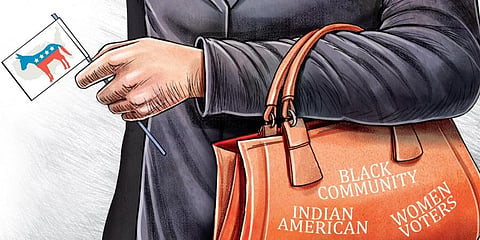

A feisty President Trump has shifted his campaign into attack mode as soon as Joe Biden, a former Vice-President and the Democratic Party Presidential nominee in the forthcoming November elections, picked California Senator Kamala Harris, 55, as his running mate. Undoubtedly a historic move, Harris’s nomination breaks an important barrier as she is the first Black-American to be picked up as a Vice-Presidential candidate of a major party and the first Indian-American woman too.
The campaign is certainly going to be full of acrimony and name-calling. Within minutes of the news breaking, Trump launched his attack by calling her “nasty”, “disrespectful”, “meanest” and “most horrible”. He has claimed that he has more Indian-American supporters that Harris. Trump has also raised the issue of the racially tinged “birtherism” against Harris, a campaign issue brought up against former President Obama that questions the place of birth and, thereby, the eligibility of a candidate to stand for election as president or VP.
Senator Harris ran for the Democratic Presidential nomination, but dropped out last December. Recent polls among Democrat Party voters had indicated a clear preference for Senators Elizabeth Warren and Harris over other potential candidates. These polls also indicated a preference for a female non-white running mate, which may have clinched the nomination in favour of Harris. The profiles of the two women Senators were far more impressive than those of their competitors.
Indian-Americans, almost four million strong and upwardly mobile, are delighted and social media has exploded in support for her nomination. Within the last few days, the Biden-Harris campaign chest has raked in millions of dollars, closing the gap between theirs and Trump’s funding, which was ahead. The high-tech community in Silicon Valley in California is expected to back Harris and could be the source of the surge in funds for the campaign.
Historically, no Vice-Presidential nominee has influenced a Presidential election nor has increased voter turnout. At 77, Biden is the oldest Presidential candidate ever in American electoral history and may not seek re-election. He has therefore indicated that he will need a Vice-President who can govern from day one and can be President in future. Harris’s nomination will send a strong message from the Democratic Party on its commitment to Black, Asian and women voters. If the Biden-Harris team wins the election, Harris will be on course to be the Democratic Presidential candidate in 2024.
Kamala Harris is the daughter of Jamaican and Indian immigrants, and grew up watching them as civil rights activists. Her mother Shyamala Gopalan came from Chennai to the US in 1959, when very few single Indian women made such a trip. She became a cancer researcher after obtaining a PhD and married Donald J Harris, currently a professor of economics (emeritus) at Stanford University. Kamala’s upbringing was more as a member of the Black community than an Indian-American, though Kamala wrote in her autobiography The Truths We Hold that she was deeply influenced by her grandparents who lived in Chennai.
She has served four years as a Senator since 2016, worked six years as California’s Attorney-General and twice as district attorney earlier. A graduate of Harvard University and University of California Hastings Law School, she has worked on removing systemic racial bias and instituted the first database in California to track racial bias in police killings. The media in India giving wide coverage to Harris’s nomination highlights how politics in the US and India are developing linkages. Many Indian-Americans see candidates through the lens of their attitude towards India.
Harris has identified herself with the Black-American community mostly and much less with the Indian-Americans. The Biden-Harris team are seen to be critical of Indian policies on Jammu and Kashmir, and prone to purvey views using the prism of human rights. The Democrats have also been critical of the CAA and are seen to be leaning towards Muslim advocacy groups. Pakistan’s state-sponsored terrorism seems to attract less attention, in comparison.
President Trump has wooed the India-American community by publicly projecting a close personal bond with PM Modi. The Trump administration has moved the US-India relationship closer in strategic areas like military hardware sale and technology trade that were no-go areas earlier. The US’s full-throated support to India against Chinese adventurism will also weigh in with Indian-American voters. This vote bloc is likely to be divided as before.
Whether Democrats, who have traditionally garnered 60% of the Indian-American vote, will retain this share is the important question. The Biden-Harris team has already come out in support for India against China’s aggression in Ladakh and for an open and transparent Indo-Pacific. On immigration, their position will be more liberal than that of Trump. They have come out strongly against “cross-border” terrorism in South Asia, a clear reference to Pakistan’s state-sponsored terrorism against India.
With three months left for campaigning, Senator Harris has already set the trend by attacking President Trump, leaving Senator Biden to concentrate on being “Presidential” and focus on policy issues. Trump can be expected to infuse his attacks on Biden-Harris with racial overtones and anti-left-liberal rhetoric. Harris is expected to lead the attack on Trump’s handling of the Covid pandemic. Criticising Trump, she said, “This is what happens when we elect a guy who isn’t up for the job,” and “Our country ends up in tatters and so does our reputation around the world”.
Pinak Ranjan Chakravarty
Former Ambassador, Ex-Secretary in MEA & currently a Visiting Fellow at ORF, Delhi
(pr.chakravarty@gmail.com)